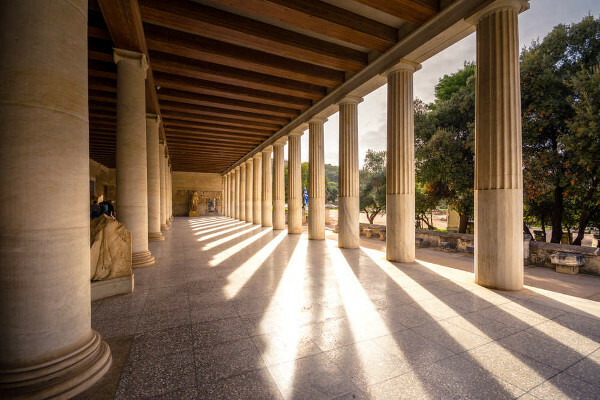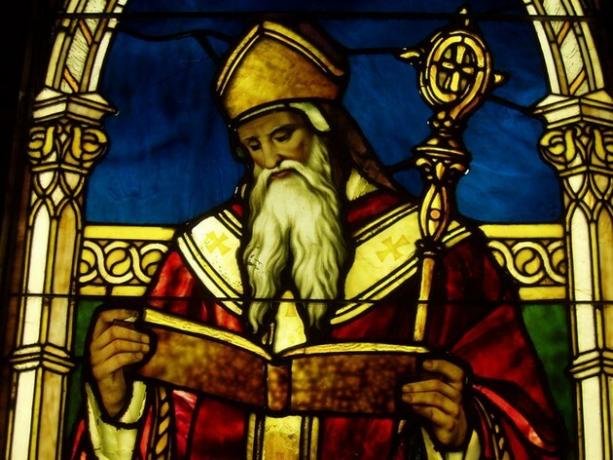O stoicism was one of the philosophical currents of Hellenism most influential in Antique. This school of thought originated in the Greek city of Athens around 300 BC. C., though its founder, Zeno, was a natural foreigner from Scythius (present-day Larnaca, on the island of Cyprus). The name of this school originated from the place where this thinker met with his disciples, namely, a portico of the public space destined for political discussion in Athens - the agora. In all three phases, the inheritance Socratic is highlighted.
Read too: Cosmology - the field of study that gave rise to Western philosophy
Characteristics of Stoicism
The best known aspect of this school of thought is its perspective ethic based on indifference (ataraxia, in Greek). In it the philosophy it is understood as an exercise and not as a merely intellectual activity. These thinkers believed that everything that exists was under the determination of a harmonic cosmic force and that virtue would lie in living in accordance with his design.
The other goods that human beings can aspire to, such as health, contentment and friendship, are secondary and not essentially good. Similarly, typically rejected notions such as illness and enmity should be avoided. The refusal to be carried away by feelings and desires aims to prevent excesses from being committed and superfluous ends from being valued. Only what is unconditional can be considered essentially good or bad. Preserving a good reputation is beneficial, but its loss should not be bitterly mourned, just as enmity should be avoided, though its presence does not diminish happiness.

The causality of events would imply a determinism, before which the only virtuous attitude would be acceptance, since these causes are external and independent of will. The acceptance of fate would be compatible, however, with the will to do good, since this would be in the realm of interiority. This choice would be the path to happiness, already indicated by Zeno, since the important thing would be to maintain consistency and not effectively reach an external end through actions.
These thinkers, especially in the first phase, privileged the sensations and rejected the intelligible aspect of the theory platonic. Not all impressions, however, were true. What arrives through the senses would still need to be acquiesced and could be rejected as a false representation or lead to suspension of judgment.
The figure of the sage was present as an ideal that was not achieved by any supporter of Stoicism. Only this character would be in a state of bliss and attain knowledge. People are generally presented as vacillating between vice and virtue, being attracted by desires and feelings and needing help to orient themselves by reason.
know more: Cave myth - philosophical allegory that reflects on knowledge
Stages and main thinkers of Stoicism
Much of the thinking of these early thinkers is now accessible only through doxographs. Marco Túlio Cicero, thinker and philosopher at the end of the 2nd century BC. C., and Lucius Mestrius Plutarch, a Greek essayist who lived 100 years later, are relevant sources, although they adopt a critical perspective. What little we know about the lives of these thinkers is presented in the famous Lives of eminent philosophers, by Diogenes Laertius.
THE first phase is marked by the reflections of Zeno in Athens. He is named as the author of more than 20 books, including one named writing Republic, in which he defended egalitarian principles, and was the first to affirm the school's central thesis: “life must follow nature”. he is succeeded by Cleansers, by Assos, who defended materialism, even stating that the soul is matter.
The last thinker of this phase is Chrysippus de Solos (a city located in the region of present-day Turkey), which systematizes the thoughts of the founder of this philosophical current and defends it from attacks by members of Plato's Academy. It is recognized by many ancient thinkers as a great logical and he dedicated himself to studying the relationship between propositions and to combating fallacies..
Do not stop now... There's more after the advertising ;)
THE second level marks the entry of Stoic thought into Rome. This period begins, still in Athens, with Diogenes from Babylon, who is sent on a delegation to Rome in 155 BC. C., and Panecio of Rhodes, which resumed some platonic themes and influenced the writing About the duties, of Cicero.
Possidonium of Apaméia, who probably lived between 135 a. Ç. and 51 a. C., was a polymath and believed that the soul, as Plato explained, would consist of an irrational part. He opened a school on the island of Rhodes, which Cicero attended briefly. The group of thinkers from this period is criticized for a return to Platonic themes and for having been influenced by other schools of thought.
THE last phase it is the one with the largest textual font and allows for a better understanding of previous periods; of Latin slope, it has its origin in the diplomatic visit of 155 a. Ç. Lucius Aneu Seneca he is the leading Roman Stoic thinker of the time. In his writings, emphasizes thefalseness of emotional response to everyday facts. Understanding the mind as a rational unit, he proposed that these responses would be reasoning flaws. Many of his writings have been preserved, among the most relevant are: about the brevity of life; about anger; about the providence; and about the tranquility of the soul.

epictet, philosopher who was probably born in the year 55 d. Ç. and he was from Phrygia (a region in present-day Turkey), he had been a slave and would have gained freedom in apathetic resistance to a cruelty done by his master, an event in which he had his leg broken. This unconfirmed report reinforces the notion of self-control (autarchy, in Greek) in the face of the disturbances of life. His reflections were recorded by Lucius Flavio Arrian, his disciple, who compiled the famous Epictetus Encheiridion, a kind of pocket manual to face everyday difficulties.
the famous emperor Marco Aurelio he acquires recognition as a philosopher and ruler while still alive, and his contact with Stoic philosophy originates with his tutor, Júnio Rustico. Your Meditations, text whose title and compilation are posthumous, can be understood as a personal record for your moral development and not as a work aimed at publication, which explains the unsystematic nature of these reflections.
Even at this stage, these thinkers maintained the original intuition that the philosophy would lead to a way of living and would not go back to theoretical knowledge. The need for daily meditation is mentioned at many times in the texts that have come down to us.
See too: Pre-Socratics - the initiators of Greek philosophy
Top quotes
about anger:
“What is beautiful and dignified is to present yourself as the defender of your parents, children, friends, fellow citizens, driven by your duty, benevolent, considerate, prudent, not impulsive and angry. Indeed, no passion is more willing to avenge itself than anger, and for that very reason it is unable to avenge itself. Because it is too hasty and insane, like all greed in general, it itself serves as an obstacle to what it rushes to. So, neither in peace nor in war, it was never a good.”|1|
about the brevity of life:
“The biggest obstacle to life is expectation, which depends on tomorrow and misses the present moment. You dispose of what is in the hands of Fortune, you leave aside what is in yours. Where are you looking? Where do you project yourself? Everything to come rests on uncertainty. Live right away!”|2|
filleridion:
“Things do not disturb men, but opinions about things do. For example, there is nothing terrible about death, or to Socrates too it would have appeared that way, but it is the opinion about death – that it is terrible – that is terrible. So, when obstacles come to us, or we worry, or grieve, let us never consider the cause other than ourselves – that is, our own opinions.”|3|
Meditations:
“All that is in agreement with you is in agreement with me, O Cosmos! Nothing that happens to you in due course happens to me too soon or too late. All that your seasons produce, O Nature, is fruit for me.”|4|
the search for happiness
The supporters of this school of thought were involved in many clashes with other schools from the same period., like the skeptics, the Epicureans and the remnants of Plato's academy. In direct opposition to Epicureanism, they rejected passions or pleasures as sources of happiness and considered these to be sources of disturbances that disturbed the soul.
The attempt to adapt to external events to satisfy a desire would not be an adequate means of seeking happiness, so happiness would be related to the acceptance of the design of the harmonious determination of events and the decision to choose what is unconditionally good.
The result of this decision would not need to be reflected in outward achievements, so many of these thinkers were described as calm people or with a steady spirit. It is not simply a matter of inhibiting or repressing reactions to events, but of self-control and always choose what is morally good, regardless of circumstances—peace amidst misfortunes.
Yet today there are philosophers who follow Stoic principles and continue to develop the thinking of those ancient philosophers such as William Irvine, John Sellars, and Lawrence Becker.
Grades
|1| SENECA. about anger / about the tranquility of the soul. Translation, introduction and notes by José Eduardo S. Lohner. São Paulo: Penguin Classics; Companhia das Letras, 2014.
|2|SENECA. about the brevity of life / on the sage's firmness. Translation and notes by José Eduardo S. Lohner. São Paulo: Penguin Classics; Companhia das Letras, 2017.
|3| EPICTET. Epictetus Encheiridion. Translation from Greek, introduction and commentary by Aldo Dinucci and Alfredo Julien. São Paulo: Annablume; Press of the University of Coimbra. Available at: <http://hdl.handle.net/10316.2/32825>. Accessed on Oct. 28 2019.
|4| MARCO AURELIO. Meditations. Introduction, translation and notes by Jaime Bruna. São Paulo: Cultrix, 1989.
Image Credits
|1|ImagenX / Shutterstock
By Dr. Marco Oliveira
Philosophy teacher



